7 Tips for Getting Social Security Disability Benefits in Evansville

The application process for Social Security disability benefits is long and often frustrating. The Evansville Social Security office takes an average of 18 months to have a requested hearing, and that doesn’t include initial application or rejection appeals.
Following these seven tips may help your Evansville disability application move through this long process toward a favorable result.
1. Determine Your Eligibility

Every so often, the Social Security Administration (SSA) will change the conditions that qualify people to receive disability benefits.
Qualifying conditions are published in the SSA’s Listing of Impairments, which can be confusing to navigate on your own. Sometimes, fine print or specific distinctions may mean your disability doesn’t qualify you for benefits. This is why contacting a qualified, compassionate Social Security disability lawyer to help determine your eligibility can save you valuable time and effort.
The SSA provides two types of disability benefits: disability insurance benefits (DIB) and supplemental security income (SSI).
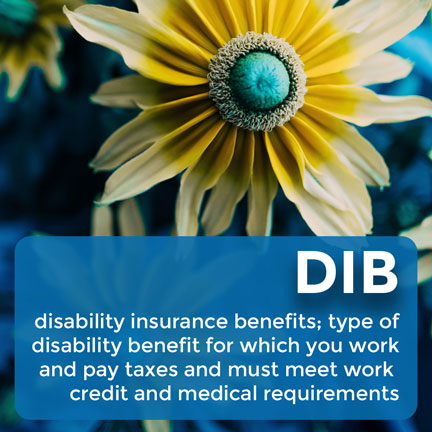 Disability Insurance Benefits (DIB)
Disability Insurance Benefits (DIB)
DIB is available to those who have paid Social Security taxes while they worked. These people must have achieved “Insured Status” to receive DIB.
Work credits determine who has paid into Social Security during working years and therefore who is eligible to draw from the system. You earn four work credits per year when you work full time and pay Social Security taxes.
The SSA states that people who became disabled after age 60 need 40 credits to receive DIB. At least half of these credits must come from the 10 years before you became disabled. Those who are blind or became disabled earlier than this may need fewer credits to be eligible.
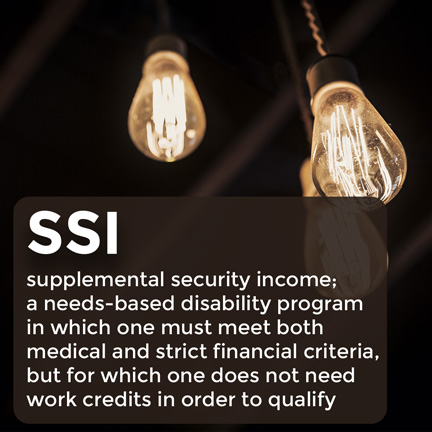 Supplemental Security Income (SSI)
Supplemental Security Income (SSI)
Unlike DIB, SSI is based on a person’s financial need. People qualify for SSI if they are disabled and meet certain asset and income requirements. In addition, people over 65 can qualify even if they aren’t disabled as long as they still fall under the financial limits.
You can qualify for SSI even if you have never worked before. Keep in mind, however, that your household income determines SSI eligibility, not just your personal income. In rare cases, those relying on SSI may lose their benefits if, for example, their spouse begins receiving DIB.
2. Have Your Doctor Confirm Your Condition

To avoid delays, applicants need a written confirmation of their disability from their doctors. A doctor’s written report also shows the SSA you’re seeking appropriate medical attention for your condition and following recommended treatment plans.
For a moment, put yourself in the shoes of the SSA. Which case is more solid: someone who describes intense stomach pain in a personal letter, or a doctor’s diagnosis of Crohn’s disease with records of numerous visits? The latter case takes the guesswork out of the SSA’s decision and may help prevent your application from being denied.
3. Gather Work History Data

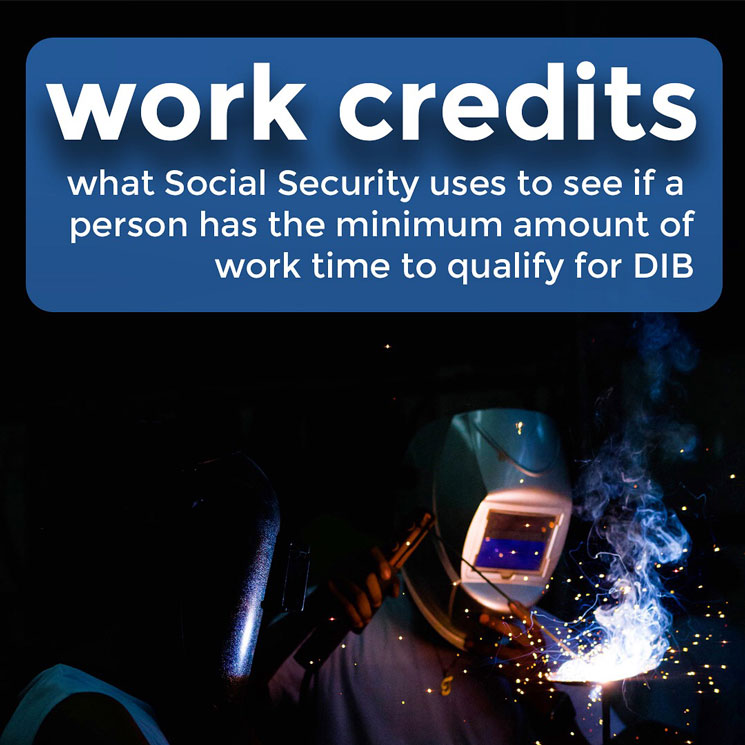 DIB applicants need to prove they have earned enough work credits in the right time frame to be eligible for benefits. If you don’t have a sustained work history, you may need to apply for SSI, not DIB.
DIB applicants need to prove they have earned enough work credits in the right time frame to be eligible for benefits. If you don’t have a sustained work history, you may need to apply for SSI, not DIB.
Your work history must show that you have both paid Social Security taxes and have been consistently employed for at least five of the last 10 years.
One more hurdle to applying for DIB involves something called substantial gainful activity (SGA). SGA is the maximum amount per month you can earn and still be eligible for DIB. This limit disqualifies those who can continue to work and earn wages despite being disabled. For the non-blind disabled, the 2017 SGA amount is $1,170.
4. Prepare a Detailed Medical History
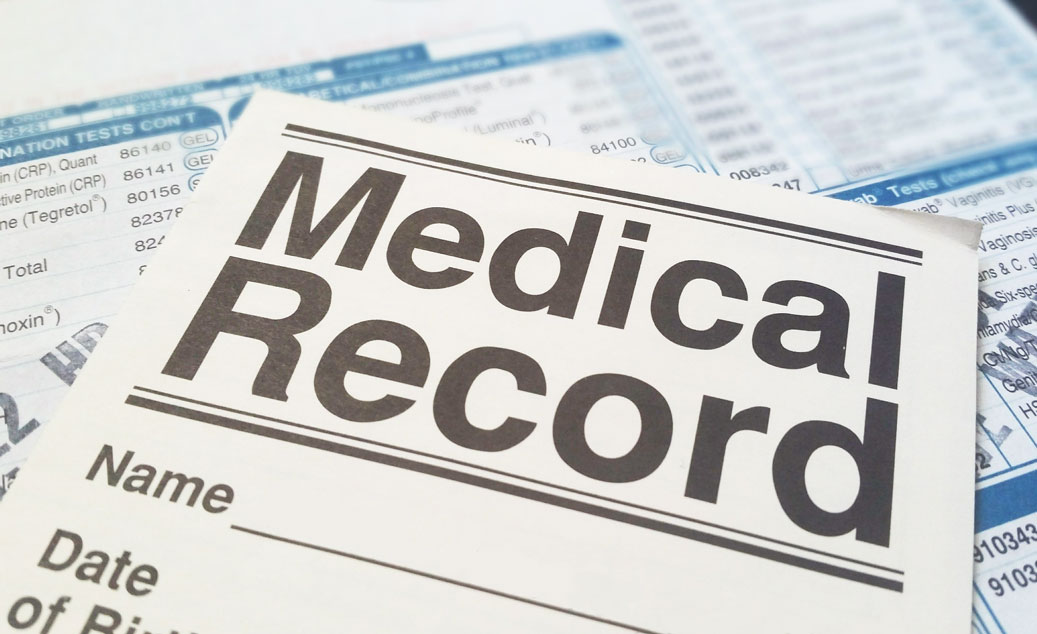
In addition to a doctor’s confirmation of disability, applicants should have a detailed medical history on hand to prove their condition makes it impossible to work.
A detailed medical history will show the complete picture of your condition. You may have a main disability, but your medical history will show how it works in tangent with other health problems you suffer from to keep you from returning to work. For example, even though your most serious condition may be the loss of a limb, you should also include information about clinical depression that also affects your daily life and ability to work.
5. Meet Every Deadline

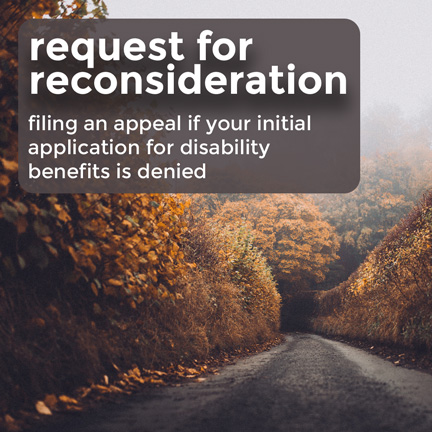 Even if your initial claim is denied, you can appeal the application with a request for reconsideration, but only within 60 days of the denial. If you miss this deadline, you will have to start the application process over. If your appeal is denied, you can proceed to a request for hearing. Again, this must be submitted within 60 days of your second denial.
Even if your initial claim is denied, you can appeal the application with a request for reconsideration, but only within 60 days of the denial. If you miss this deadline, you will have to start the application process over. If your appeal is denied, you can proceed to a request for hearing. Again, this must be submitted within 60 days of your second denial.
When you hire an Evansville disability lawyer to help you file and manage your case, it’s important to stay in close contact with them. They may inform you of application deadlines or ask you to provide additional documents before a hearing. Give them a phone number and email address where they can reach you easily, and respond to their requests promptly; all this effort goes to helping you get the benefits you deserve.
6. Seek Assistance

Nearly 70 percent of all Indiana Social Security disability applicants are denied. Often, denials aren’t due to a person’s disability but rather their application. Missing information or failing to appeal an initial rejection accounts for many denied applications. These are called technical denials.
Because of this, being well-informed is a practical advantage to getting the Social Security disability benefits you deserve. When you get and follow professional help early on, you greatly increase your chance of success.
Our Evansville disability lawyers at Hensley Legal Group offer a no-obligation consultation to determine if you’re eligible for either DIB or SSI. Call us today — if you’re out of work, every minute counts.
7. Persevere

Remember that nearly 70 percent of Indiana disability claims are denied. Now consider that nearly 50 percent of those who request a hearing receive their benefits. Clearly, perseverance counts.
No matter how many frustrations accompany the process, the fight will be worth it if you get approved in the end.
And you don’t have to go through this alone. Hensley Legal Group’s Social Security disability lawyers have years of experience with Social Security cases and care about your well-being. Download our free book to learn about eight common Social Security disability application mistakes before you hire an attorney.
For more information, contact us today for a free consultation.
Available 24/7
Free Case Review
You won’t pay any fees until we win your case.
It’s easy - you can: